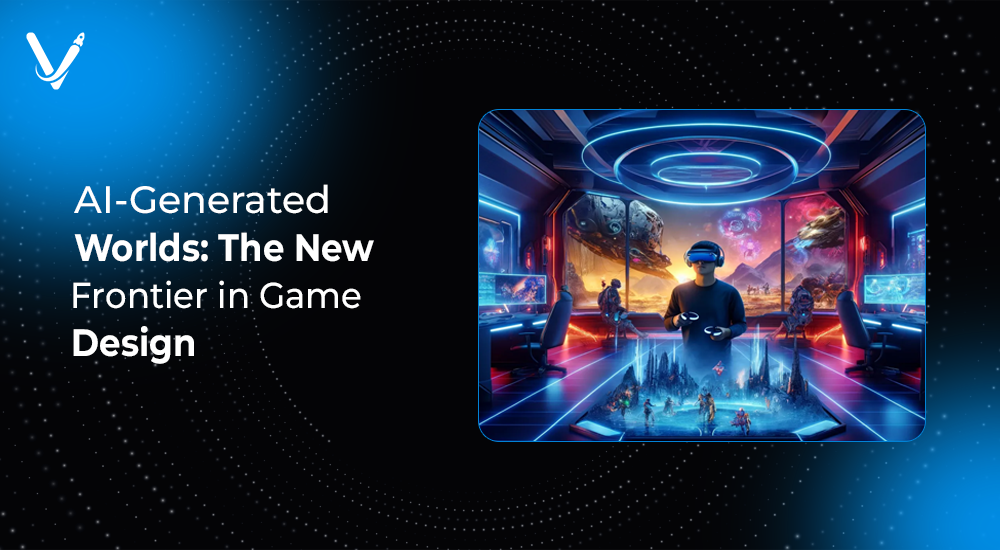AI-Generated Worlds: The New Frontier in Game Design


- Jul 17, 2025



The landscape of the video game industry is undergoing a seismic transformation. Traditional development pipelines are being redefined by the integration of artificial intelligence (AI), giving rise to a bold new paradigm: AI-generated worlds. These dynamic environments, powered by intelligent algorithms, are not only reshaping game mechanics but also unlocking new dimensions of creativity and interactivity. As we delve into AI in gaming, this article explores the future of game development, examining how artificial intelligence is revolutionizing game creation, storytelling, and player experiences.
Artificial intelligence in gaming refers to the use of machine learning models, neural networks, and procedural generation to create responsive, adaptive, and intelligent game elements. These systems analyze player behavior, generate content autonomously, and create real-time decision-making models for non-player characters (NPCs), thereby transforming static environments into living, evolving ecosystems.
The implementation of artificial intelligence in game development allows developers to craft more complex and personalized gaming experiences, leading to a surge in engagement and retention.
AI-generated worlds refer to entire virtual environments developed or augmented by AI models. Instead of being manually designed, these landscapes evolve through algorithms trained on massive datasets, including real-world geography, art styles, player behavior, and gameplay data. This enables near-limitless variability and replayability.
One of the most notable examples is Hello Games’ No Man's Sky, which uses procedural generation algorithms to create over 18 quintillion unique planets, each with its own ecosystem, climate, and geography.
The impact of AI in gaming is best understood through the lens of player experience. Traditional gaming often featured linear narratives and limited decision trees. AI shifts this structure to dynamic engagement, where the game evolves with the player.
AI-driven analytics track how players interact with the environment. Games like Middle-earth: Shadow of Mordor introduced the Nemesis System, where enemy NPCs adapt, evolve, and remember past interactions, giving rise to deeply personal rivalries.
Advanced games now use AI models to interpret player decisions and adapt quests, dialogue, and rewards accordingly. This responsiveness enhances immersion, blurring the line between scripted and emergent gameplay.
By integrating affective computing, NPCs can detect and simulate emotions. This evolution in gaming AI fosters believable character interactions, making worlds feel alive and emotionally resonant.
A modern game development company must evolve to embrace AI as both a creative collaborator and technical asset. From pre-visualization and prototyping to QA and live ops, AI now plays a vital role across the development lifecycle.
Many companies are adopting tools like:
These integrations streamline workflows, reduce costs, and elevate production value.
Ubisoft’s research lab, La Forge, has led innovations in artificial intelligence in video games, focusing on animation realism, character behavior, and procedural generation. Their AI-driven animation system reduced development time by 30% while increasing realism.
Curious minds often ask, what famous games use AI-generated elements? Some landmark titles include:
Each game exemplifies AI in video games at varying scales, pushing boundaries of what’s possible in digital storytelling.
As we peer into the future of video games, several trends indicate where AI and gaming will converge next:
AI will soon co-author game scripts, design missions, and even score music, collaborating with developers creatively.
Games will simulate ecosystems, economies, and social behaviors at unprecedented depth, driven by machine learning.
With AI-assisted tools, solo developers and small studios can compete with AAA companies, leading to an explosion of indie innovation.
The rise of persistent digital worlds will heavily rely on artificial intelligence in computer games to manage complexity, user-generated content, and real-time adaptations.
While the benefits are transformative, AI game development brings unique challenges:
Game developers must strike a balance between innovation and responsibility.
Studios aiming to adopt artificial intelligence in game development should consider the following steps:
The synergy between AI and gaming is rooted in their shared pursuit of simulation, interactivity, and learning. Games provide structured environments where AI thrives. At the same time, AI introduces unpredictability and realism that keep gameplay fresh and engaging.
Every action a player takes offers data that can refine future gameplay. This loop powers how AI is transforming the gaming experience, adapting faster and more intelligently than traditional code.
The rise of futuristic gaming genres points to experiences where AI is not just a tool, but a core mechanic. Games where the world itself is a living AI, or where narratives are crafted in real-time by neural models, are emerging as the next frontier.
Titles like AI Dungeon and experimental projects in VR/AR show how the future of computer games will blur the line between fiction and reality.
Artificial intelligence is no longer a back-end feature but a central pillar in game development. From crafting infinite worlds to simulating lifelike characters, AI is shaping the future of the video game industry. As developers and players alike embrace this shift, the possibilities for innovation grow exponentially.
At Vasundhara Infotech, we specialize in pioneering cutting-edge gaming solutions. Our expertise in game development ensures your vision becomes a reality, powered by intelligent systems and immersive design. Ready to build the next AI-driven masterpiece? Let’s co-create the future of gaming.
Copyright © 2026 Vasundhara Infotech. All Rights Reserved.